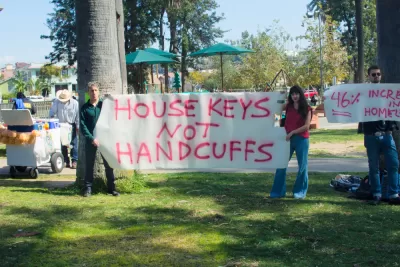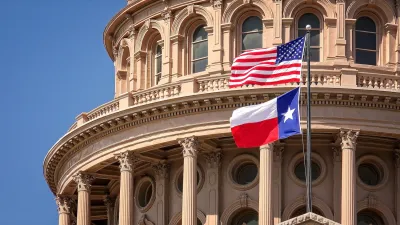‘Housing First’ and other evidence-driven homelessness response programs are showing success in some cities and regions while the number of unhoused people rises across the nation.

A Brookings report by Hanna Love and Tracy Hadden Loh assesses the state of homelessness in the United States and how some cities and regions are making progress on housing their residents even as housing costs grow and the supply of affordable housing remains insufficient to meet demand.
“In nine out of the 44 major cities that completed full PIT counts in 2023, homelessness rates either remained stable or declined between 2022 and 2023, with rates in Austin, Texas, Raleigh, N.C., Indianapolis, and Colorado Springs, Colo. declining over 10 percentage points.” Major cities like New York, Boston, and Chicago saw sharp increases in homelessness rates between 2022 and 2023, but those cities saw an overall reduction in homelessness over the last decade.
Looking at the larger picture of short- and long-term total and unsheltered homelessness trends, it’s clear that there are pockets of both progress and setbacks in U.S. cities—reinforcing the need for upstream solutions that can meet cities and regions where they are.
The report recommends five evidence-based strategies that can help ease the crisis. These include ensuring that housing policy tracks with homelessness policy, using both short- and long-term tools like emergency rental assistance, ‘housing first’ models, and zoning reform that spurs more housing production. Other suggestions include strengthening housing and employment supports for vulnerable populations, using alternative crisis response models to reduce the risk of negative interactions with law enforcement, and taking a “regional, data-driven approach” to homelessness to respond to broader structural challenges.
FULL STORY: Despite a national spike in homelessness, some US regions are finding solutions

Montreal Mall to Become 6,000 Housing Units
Place Versailles will be transformed into a mixed-use complex over the next 25 years.

Planetizen Federal Action Tracker
A weekly monitor of how Trump’s orders and actions are impacting planners and planning in America.

DARTSpace Platform Streamlines Dallas TOD Application Process
The Dallas transit agency hopes a shorter permitting timeline will boost transit-oriented development around rail stations.

Tulsa Paid Remote Workers $10,000 to Move In — Nearly All of Them Stayed
The Tulsa Remote program generated more than $4 in local economic benefits for every dollar spent.

Chicago Transit: $770M Shortfall, 40% Service Cuts Loom
Despite dire warnings from transit officials, the Illinois General Assembly ended its legislative session without a solution.

Without International Immigrants, the Rural US Population Would Be Falling 58%
Census data shows that population growth in rural areas is due in large part to international migrants.
Urban Design for Planners 1: Software Tools
This six-course series explores essential urban design concepts using open source software and equips planners with the tools they need to participate fully in the urban design process.
Planning for Universal Design
Learn the tools for implementing Universal Design in planning regulations.
City of Mt Shasta
City of Camden Redevelopment Agency
City of Astoria
Transportation Research & Education Center (TREC) at Portland State University
City of Camden Redevelopment Agency
Municipality of Princeton (NJ)
Regional Transportation Commission of Southern Nevada





























